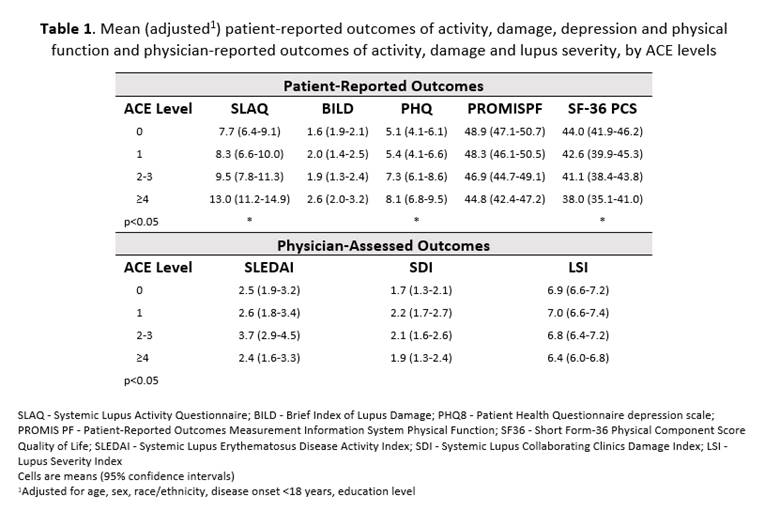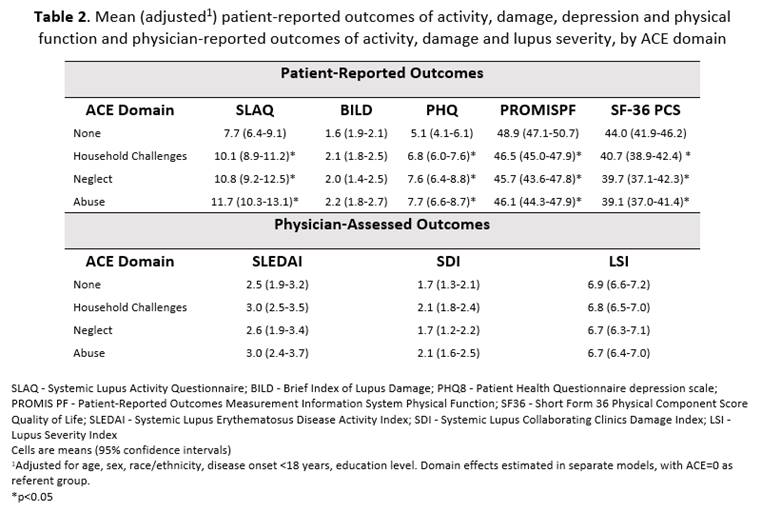Session Information
Session Type: ACR Poster Session A
Session Time: 9:00AM-11:00AM
Background/Purpose: Adverse childhood experiences (ACEs) such as abuse, neglect and domestic violence are associated with poor adult health status and immune dysregulation. The extent and impact of ACEs on patients with existing autoimmune disease are not known. We compared prevalence of ACE in SLE patients with the general population and investigated relationships between ACEs and health status in SLE patients.
Methods: Data derive from the California Lupus Epidemiology Study (CLUES), a diverse population based cohort of individuals with SLE. Participants completed the ACE questionnaire, a validated 10 item survey covering 3 domains (abuse, neglect and household challenges). We estimated prevalence of ACE in 270 CLUES participants compared to the general population using 2015 California Behavioral Risk Factor Surveillance System data (1:1 matching by county, age, sex and race/ethnicity). We examined 5 patient-reported outcomes (SLE activity, damage, depression, physical function and quality of life) and 3 physician-assessed measures (SLE disease activity, damage and severity indices). SLE outcomes were compared across ACE levels (0, 1, 2-3, ≥4) and domains using multivariable linear regression controlling for age, sex, race/ethnicity, disease onset <18 years, and education level. Domain effects were estimated in separate models. Statistical significance was p<0.05.
Results: ACE levels and domains were similar for SLE patients and the general population. Six in 10 individuals (63.3%) with SLE reported ≥ 1 ACE and 19.3% had ≥ 4 ACEs. Nonzero ACE levels were more common (>58%) in women, Latino and African American participants, those who did not graduate college and those with lupus nephritis. In adjusted models, higher overall ACE score was associated with greater patient-reported SLE activity and damage, higher levels of depressive symptoms, poorer physical function and quality of life, though not all measures reached statistical significance (Table 1). ACE levels did not predict worse physician-assessed SLE activity, damage or severity (Table 2). The results for all 3 ACE domains paralleled results for ACE score levels with worse patient-reported, but not physician-assessed outcomes.
Conclusion: ACEs were equally common among CLUES cohort and the general population. Accumulation of adverse experiences was associated with poorer patient-reported health measures, but not physician-assessed outcomes, in adulthood. Results reinforce the need to prevent ACEs and promote resilience when a history of ACE is ascertained.
To cite this abstract in AMA style:
DeQuattro K, Trupin L, Li J, Katz P, Lanata C, Yelin EH, Rush S, Criswell LA, Murphy L, Dall'Era M, Yazdany J. Relationships between Adverse Childhood Experiences and Health Status in Systemic Lupus Erythematosus [abstract]. Arthritis Rheumatol. 2018; 70 (suppl 9). https://acrabstracts.org/abstract/relationships-between-adverse-childhood-experiences-and-health-status-in-systemic-lupus-erythematosus/. Accessed .« Back to 2018 ACR/ARHP Annual Meeting
ACR Meeting Abstracts - https://acrabstracts.org/abstract/relationships-between-adverse-childhood-experiences-and-health-status-in-systemic-lupus-erythematosus/


